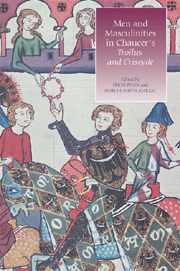Book contents
- Frontmatter
- Contents
- Contributors
- Abbreviations
- Introduction: The Myths of Masculinity in Chaucer's Troilus and Criseyde
- 1 “Beautiful as Troilus”: Richard II, Chaucer's Troilus, and Figures of (Un)Masculinity
- 2 The State of Exception and Sovereign Masculinity in Troilus and Criseyde
- 3 Revisiting Troilus's Faint
- 4 What Makes a Man? Troilus, Hector, and the Masculinities of Courtly love
- 5 Masculinity and Its Hydraulic Semiotics in Chaucer's Troilus and Criseyde
- 6 Masochism, Masculinity, and the Pleasures of Troilus
- 7 “The Dreams in Which I'm Dying”: Sublimation and Unstable Masculinities in Troilus and Criseyde
- 8 “A Mannes Game”: Criseyde's Masculinity in Troilus and Criseyde
- 9 Troilus's Gaze and the Collapse of Masculinity in Romance
- 10 Sutured Looks and Homoeroticism: Reading Troilus and Pandarus Cinematically
- 11 Being a Man in Piers Plowman and Troilus and Criseyde
- 12 “The Monstruosity in Love”: Sexual Division in Chaucer and Shakespeare
- Index
- CHAUCER STUDIES
1 - “Beautiful as Troilus”: Richard II, Chaucer's Troilus, and Figures of (Un)Masculinity
Published online by Cambridge University Press: 12 September 2012
- Frontmatter
- Contents
- Contributors
- Abbreviations
- Introduction: The Myths of Masculinity in Chaucer's Troilus and Criseyde
- 1 “Beautiful as Troilus”: Richard II, Chaucer's Troilus, and Figures of (Un)Masculinity
- 2 The State of Exception and Sovereign Masculinity in Troilus and Criseyde
- 3 Revisiting Troilus's Faint
- 4 What Makes a Man? Troilus, Hector, and the Masculinities of Courtly love
- 5 Masculinity and Its Hydraulic Semiotics in Chaucer's Troilus and Criseyde
- 6 Masochism, Masculinity, and the Pleasures of Troilus
- 7 “The Dreams in Which I'm Dying”: Sublimation and Unstable Masculinities in Troilus and Criseyde
- 8 “A Mannes Game”: Criseyde's Masculinity in Troilus and Criseyde
- 9 Troilus's Gaze and the Collapse of Masculinity in Romance
- 10 Sutured Looks and Homoeroticism: Reading Troilus and Pandarus Cinematically
- 11 Being a Man in Piers Plowman and Troilus and Criseyde
- 12 “The Monstruosity in Love”: Sexual Division in Chaucer and Shakespeare
- Index
- CHAUCER STUDIES
Summary
In his description of Richard II's royal entry into London in 1392, Richard Maidstone, in his Concordia, lavishes praise upon the youthful king's handsomeness and sex-appeal by likening him to Troilus:
Iste velud Troylus vel ut Absolon ipse decorus,
Captivat sensum respicientis eum.
Non opus est omnem regis describere formam:
Regibus in cuntis non habet ille parem.
Larga decoris ei si plus Natura dedisset,
Clauderet hunc thalamis invida forte Venus!
(He himself, beautiful as Troilus or as Absalom,
Captures the attention of the onlooker.
It takes no effort to describe the king's every feature:
Among all earthly rulers he has no equal.
If generous Nature had given him more beauty,
Jealous Venus might have locked him in her bedroom!)
This literary allusion raises the obvious question of what Maidstone implied when comparing the English king with the Trojan prince.
The name Troilus did not enjoy wide currency in England before Chaucer's Troilus and Criseyde began circulating among metropolitan readers during the mid-1380s, although the semantic implications of Troilus as the nickname “Little Troy” would have gained resonance amid contemporary discussions celebrating London as the “New Troy.” St. Erkenwald made this comparison explicit – “Now that London is neuenyd hatte the New Troie” – and Maidstone himself reiterated this claim near the beginning of his Concordia: “bona felici sunt, Nova Troia, tibi!” – “blessings are yours, O happy New Troy.” John Gower's Mirour de l'Omme (c. 1377) made one of the earliest references to “the story of Troilus and fair Criseyde,” perhaps as a work-in-progress.
- Type
- Chapter
- Information
- Publisher: Boydell & BrewerPrint publication year: 2008



